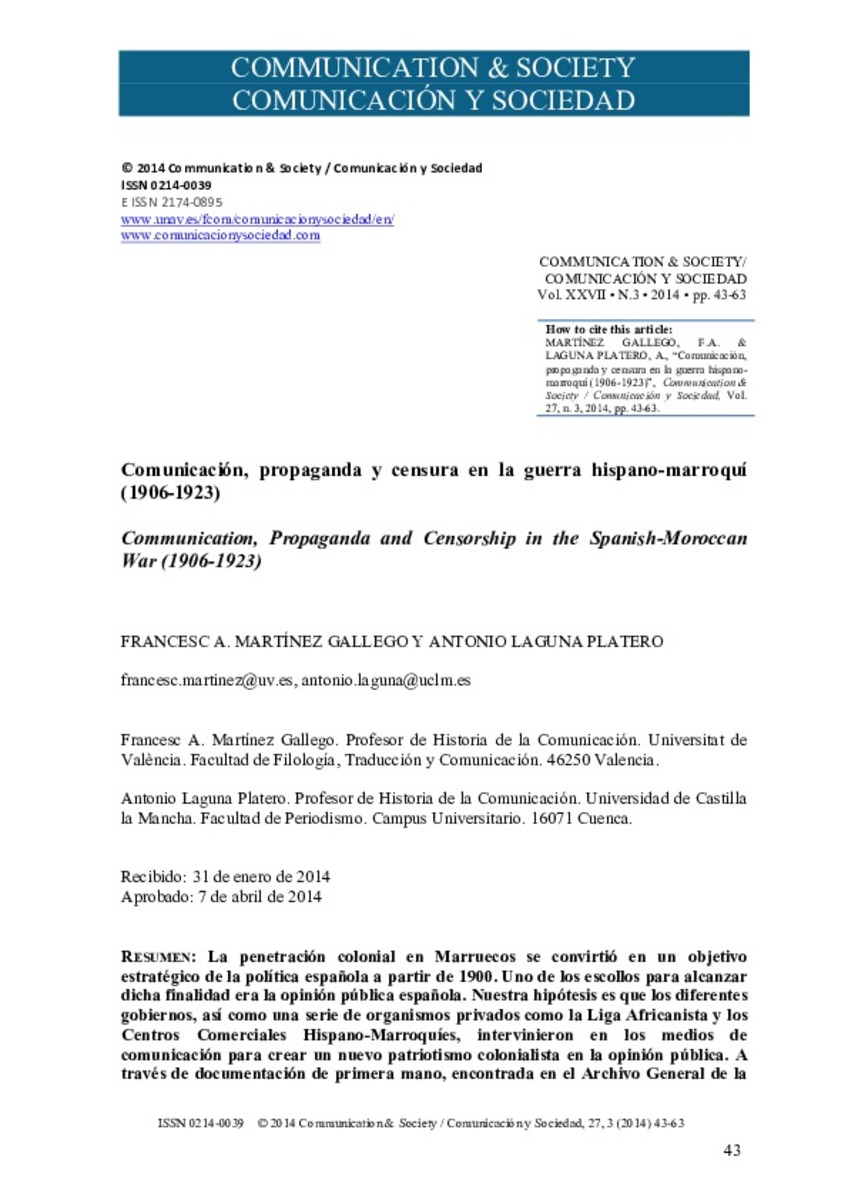Full metadata record
| DC Field | Value | Language |
|---|---|---|
| dc.creator | Martínez-Gallego, F.A. (Francesc A.) | - |
| dc.creator | Laguna-Platero, A. (Antonio) | - |
| dc.date.accessioned | 2015-03-04T14:35:24Z | - |
| dc.date.available | 2015-03-04T14:35:24Z | - |
| dc.date.issued | 2014 | - |
| dc.identifier.citation | MARTÍNEZ GALLEGO, F.A. & LAGUNA PLATERO, A., “Comunicación, propaganda y censura en la guerra hispano- marroquí (1906-1923)”, Communication & Society / Comunicación y Sociedad, Vol. 27, n. 3, 2014, pp. 43-63. | es_ES |
| dc.identifier.issn | 2174-0895 | - |
| dc.identifier.uri | https://hdl.handle.net/10171/37731 | - |
| dc.description.abstract | La penetración colonial en Marruecos se convirtió en un objetivo estratégico de la política española a partir de 1900. Uno de los escollos para alcanzar dicha finalidad era la opinión pública española. Nuestra hipótesis es que los diferentes gobiernos, así como una serie de organismos privados como la Liga Africanista y los Centros Comerciales Hispano-Marroquíes, intervinieron en los medios de comunicación para crear un nuevo patriotismo colonialista en la opinión pública. A través de documentación de primera mano, encontrada en el Archivo General de la dministración y en el Archivo Central del Servicio Histórico Militar, se reconstruyen las acciones tendentes a estimular un nuevo discurso (periodístico, literario, cinematográfico, etc.) a favor del colonialismo. También se estudian los controles que los gobiernos establecieron sobre la prensa crítica con la guerra (censura, utilización de fondos reservados, etc.). El trabajo concluye señalando la centralidad de la cuestión colonial. Asimismo, establece la combinación de mecanismos de control y estímulo hacia los medios de comunicación que dispusieron diferentes gobiernos para conseguir que la penetración en Marruecos fuese vista por la opinión pública como “su misión civilizadora”. | es_ES |
| dc.description.abstract | The colonial penetration in Morocco became a strategic objective of Spanish policy after 1900. One of the pitfalls of achieving that aim was the Spanish public opinion. Our hypothesis is that the different governments as well as a number of private organizations such as the Africanist League and Hispano-Moroccan Trade Centres intervened in the media to create a new colonial patriotism in public opinion. Through first-hand documentation, found in the General Archive of the Administration and the Central Archive of the Military Historical Service, some actions, which were intended to encourage a new discourse, (journalistic, literary, film, etc.), are reconstructed in support of colonialism. The controls that governments established over the press which is critical with the war are also studied (censorship, the use of reserved funds, etc.) The study concludes by pointing out the centrality of the colonial matter. It also establishes the combination of control and stimulus mechanisms towards the media that various governments provided to be sure that the public opinion could see their penetration in Morocco as “their civilizing mission”. | es_ES |
| dc.language.iso | spa | es_ES |
| dc.publisher | Servicio de Publicaciones de la Universidad de Navarra | es_ES |
| dc.rights | info:eu-repo/semantics/openAccess | es_ES |
| dc.subject | Materias Investigacion::Comunicación | es_ES |
| dc.subject | Propaganda | es_ES |
| dc.subject | Censura | es_ES |
| dc.subject | Medios de comunicación | es_ES |
| dc.subject | Guerra | es_ES |
| dc.subject | Colonialismo | es_ES |
| dc.subject | Africanismo | es_ES |
| dc.subject | Marruecos | es_ES |
| dc.subject | Censorship | es_ES |
| dc.subject | Media | es_ES |
| dc.subject | War | es_ES |
| dc.subject | Colonialism | es_ES |
| dc.subject | Africanism | es_ES |
| dc.subject | Morocco | es_ES |
| dc.title | Comunicación, propaganda y censura en la guerra hispano-marroquí (1906-1923) | es_ES |
| dc.title.alternative | Communication, Propaganda and Censorship in the Spanish-Moroccan War (1906-1923) | es_ES |
| dc.type | info:eu-repo/semantics/article | es_ES |
| dc.identifier.doi | 10.15581/003.27.35987 | es_ES |
Files in This Item:
Statistics and impact
Items in Dadun are protected by copyright, with all rights reserved, unless otherwise indicated.






